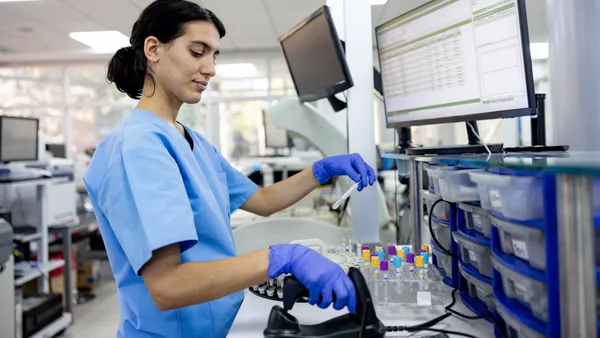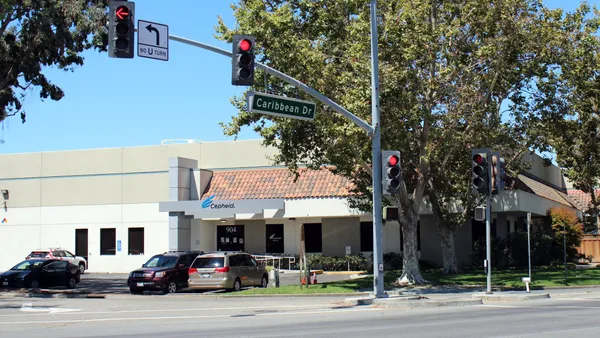Dive Brief:
- A blood test for detecting small fragments of cancer DNA in breast cancer patients showed greater sensitivity than current circulating tumor DNA (ctDNA) tests in a study of 33 patients.
- The targeted digital sequencing (TARDIS) test can be customized to monitor each patient for disease progression over time for early detection of tumor recurrence, according to the study. Researchers hope the liquid biopsy test can help breast cancer patients avoid unnecessary surgeries.
- The study, published last week in the journal Science Translational Medicine, was led by the Translational Genomics Research Institute, Mayo Clinic in Arizona and the Biodesign Institute at Arizona State University, with help from Cambridge University.
Dive Insight:
Circulating tumor DNA tests have shown promise for monitoring treatment response, but detecting residual disease in the bloodstream of patients with non-metastatic breast cancer has proven difficult. In early-stage patients, there may not be enough fragments of ctDNA in a sample to detect a mutation.
The TARDIS test addresses this challenge by integrating the results of multiple circulating tumor mutations. The researchers analyzed up to 115 mutations per patient in 80 plasma samples from 33 women with stage I to III breast cancer.
According to the study, the test detected ctDNA in as low as 2 parts per 100,000 in patient blood. That is precise enough to tell if early-stage patients have responded well to pre-operative drug therapy, the researchers said.
The goal is to be able to avoid overtreatment or undertreatment in pre-surgical patients. Patients with non-metastatic cancer may receive preoperative chemotherapy, surgery and radiation therapy, and postoperative therapy. Some patients could have been cured with less intensive treatment, and the benefit of consecutive therapies is not clear, the researchers said.
The TARDIS test’s sensitivity could allow physicians to tell as early as after one cycle whether chemotherapy is working, said study author Carlos Caldas, professor of cancer medicine at the University of Cambridge.
The study results showed high accuracy in assessing molecular response and residual disease during neoadjuvant therapy using ctDNA analysis, with an up to 100-fold improvement beyond current ctDNA detection, the researchers said. After neoadjuvant therapy, ctDNA concentrations were lower in patients with pathological complete response (pathCR), compared to patients with residual disease.
"This has enormous implications for women with breast cancer. This test could help plan the timing and extent of surgical resection and radiation therapy after patients have received pre-operative therapy," study author Barbara A. Pockaj, a surgical oncologist at Mayo Clinic in Arizona, said.
The research was funded by the National Cancer Institute, Mayo Clinic Center for Individualized Medicine, the V Foundation for Cancer Research, Science Foundation Arizona, the Ben and Catherine Ivy Foundation, SmartPractice, City of Hope and the Translational Genomics Research Institute.










